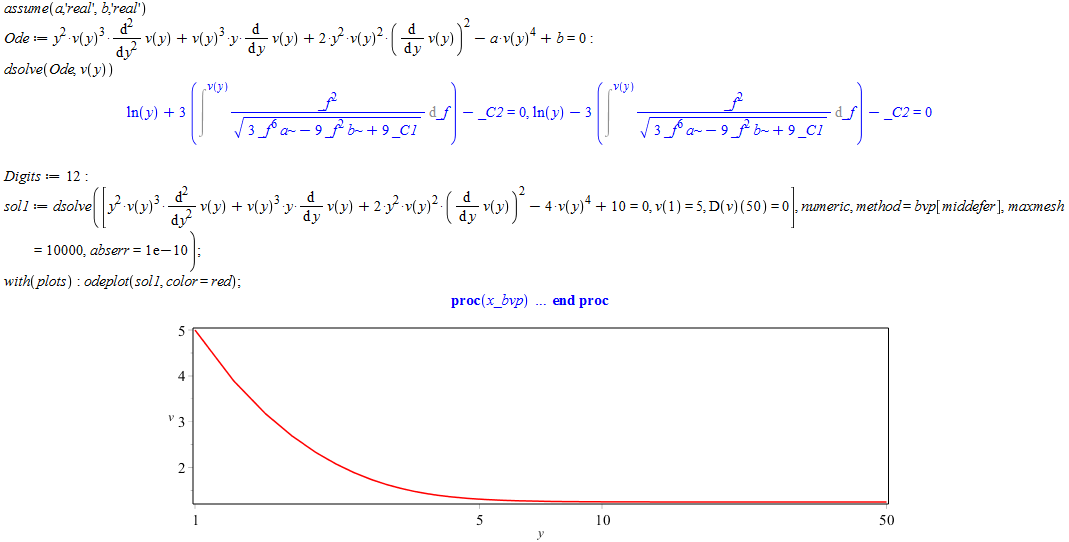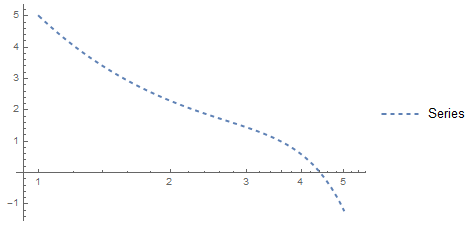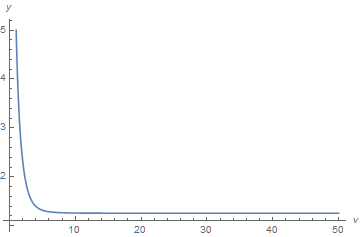NDSolve It has problems with equation.Why? I don't No.Solution with $MAPLE.$

Let's try analytically.
$$-a v(y)^4+b+y^2 v(y)^3 v''(y)+2 y^2 v(y)^2 v'(y)^2+y v(y)^3 v'(y)=0 \tag{1}$$
By making the substitution $y=exp(t)$. When subbing for the independent variable, we need to make careful use of the chain rule to express $v(y),v′(y),v″(y)$ in terms of $v(t),v′(t),v″(t)$.
ode = y^2*v[y]^3*v''[y] + v[y]^3 *y*v'[y] + 2 y^2*v[y]^2*v'[y]^2 -
a*v[y]^4 + b;
subs = Exp[t]; newode =
ode /. {v[y] -> v[t], v'[y] -> v'[t]/D[subs, t],
v''[y] -> (v''[t] - D[subs, {t, 2}] v'[t]/D[subs, t])/D[subs, t]^2,
y -> subs};
newode2 = Expand[Collect[FullSimplify[newode], v''[t]]]
$-a v(t)^4+b+v(t)^3 v''(t)+2 v(t)^2 v'(t)^2=0 \tag{2}$
Using the substitution $v'(t)=k(v)$,where $v$ plays the role of the independent variable, and taking into account the relations $v''(t)=k'(t)=k'(v)*v'(t)=k'(v)*k(v)$, can reduce to a first-order equation:
newode3 = newode2 /. {v'[t] -> k[v], v''[t] -> k[v]*k'[v], v[t] -> v}
$-a v^4+b+v^3 k(v) k'(v)+2 v^2 k(v)^2=0 \tag{3}$
ODE = DSolve[newode3 == 0, k[v], v]
$\left\{k(v)\to -\frac{\sqrt{a v^6-3 b v^2+3 c_1}}{\sqrt{3} v^2},k(v)\to
\frac{\sqrt{a v^6-3 b v^2+3 c_1}}{\sqrt{3} v^2}\right\} \tag{4}$
then $v'(t)=k(v)$ and $t=Log(y)$ :
{Integrate[1/k[v] /. ODE[[1]], v] == Log[y] + C[2],
Integrate[1/k[v] /. ODE[[2]], v] == Log[y] + C[2]}
We have analyticall solution:
$\left\{-\sqrt{3} \int \frac{v^2}{\sqrt{a v^6-3 b v^2+3 c_1}} \, dv=c_2+\log
(y),\sqrt{3} \int \frac{v^2}{\sqrt{a v^6-3 b v^2+3 c_1}} \, dv=c_2+\log
(y)\right\}$
$c_1$ and $c_2$ integration constants. Mathematica can't find this Integrated's $:($
Try's with Series.
We need a equation $(2)$.By making the substitution $y=exp(t)$ and solve with parametr $t$ $t=Log(y)$ we have a new boundary conditions:
$$\{v(0)=5,v(\log (50))=0\}$$
a = 4;
b = 10;
n = 13;
v = Sum[c[i]*t^i, {i, 0, n}] + O[t]^(n + 1);
ODE = v^3*D[v, {t, 2}] + 2*D[v, t]^2*v^2 - a*v^4 + b == 0;
V = FullSimplify@
Normal[v /. Solve[LogicalExpand[ODE], Table[c[i], {i, 1, n}]]] //
Quiet;
Sol = First@
Solve[{V == 5 /. t -> 0, D[V, t] == 0 /. t -> Log[50]}, {c[0],
c[1]}];
VV = V /. Sol /. t -> Log[y] // N
LogLinearPlot[VV, {y, 1, 5}, PlotRange -> All,
PlotLegends -> {"Series"}, PlotStyle -> {Thick, Dashed}]
Solution is not accurates ,you must increase $n=20$,mayby $50$.





50.0) with exact ones (e.g.50) and report back. $\endgroup$v[1] == 5, v'[1] == -5.740225. For much more negative values of $v'[1]$, the equations become non-amenable to solution. You seem to be trying to solve the DE at a singularity. $\endgroup$v[1] == 5, v'[1] == -5.740226373077693`50. $\endgroup$